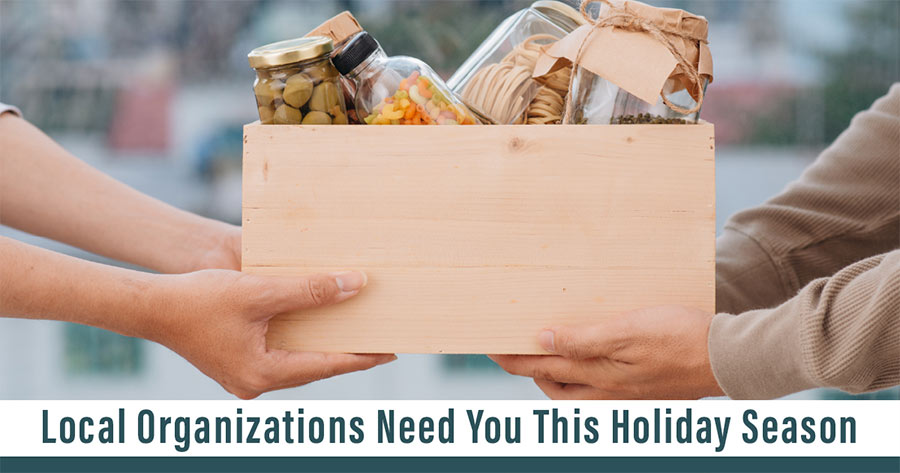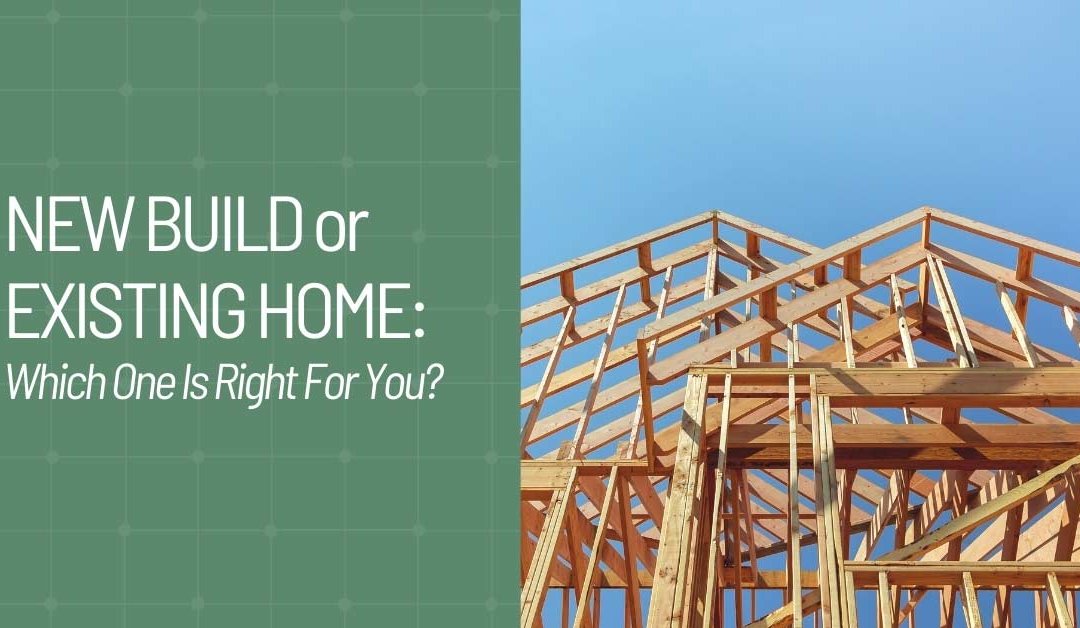Homebuyers today are facing a huge dilemma. There simply aren’t enough homes for sale.1
Nationwide, there were 1.27 million active listings in September, down 13% from the previous year. According to the National Association of Realtors, that’s about 2.4 months of inventory, which is far less than the six months that is generally needed to strike a healthy balance between supply and demand.2
Given the limited number of available properties, if you’re a buyer in today’s market, you may need to expand your search to include both new construction and resale homes. But it can feel a little like comparing apples to oranges.
Let’s take a closer look at some of the factors you should take into account when choosing between a new build or an existing home.
TIMEFRAME
How quickly do you want (or need) to move into your next home? Your timeframe can be a determining factor when it comes to choosing between a new build or resale.
New Build
If you opt for new construction, you may be surprised by how long you have to wait to get the keys to your new digs. Currently, many home builders are dealing with unique challenges brought on by the COVID-19 pandemic, including rising costs, labor and material shortages, and shipping delays. While historically it took around five to six months to build a home, many builders are now reporting construction timelines closer to a year or more.3
These issues have led some builders to cancel contracts or raise the price on unsuspecting homebuyers long after agreements were signed. Unfortunately, this scenario can throw a major wrench in your moving plans and significantly delay your timeline.
To minimize these types of surprises, it’s crucial to have a real estate agent represent you in a new home purchase. We can help negotiate better contract terms and advise you about the potential risks involved.
Existing Home
If you’re in a hurry to move into your next residence, then you may want to stick to shopping for an existing home.
You can typically move into a resale home as soon as you’ve closed the deal. The average time it takes to close a home purchase is around 51 days, but it can vary based on loan type and market activity.4
If you need to move even sooner, it’s sometimes possible to close faster, especially if you’re a cash buyer. In fact, many sellers prefer a quick closing, so it can give you an advantage in a competitive market.
LOCATION
From commute to construction to amenities, there’s a lot to consider when choosing your next neighborhood.
New Build
With a brand-new home, you’re more likely to move into a neighborhood that’s located on the edge of town and is still undergoing development.5 This could mean a longer commute and ongoing construction for some time.
However, new developments can also offer a lot of amenities that appeal to modern homebuyers. Water features, hike-and-bike trails, tot lots, and dog parks are just a few of the enhancements we’re seeing pop up in master-planned communities across the country. And some feature new schools and their own urban-like centers with restaurants, retail, and office space.6
Existing Home
An existing home is more likely to be located close to town in a neighborhood with mature trees, established schools, and a deeply-rooted community. As a result, you may find the neighborhood’s trajectory to be more predictable than an up-and-coming area.
But the amenities may be lacking and the infrastructure dated when compared to newer communities. And while some homebuyers love the charm and eclectic feel of an older neighborhood, others prefer the sleek and cohesive look of a newer development.
MAINTENANCE
Are you a DIY enthusiast, or do you prefer a low-maintenance lifestyle? Set realistic expectations about how much time, effort, and money you want to devote to maintaining your next home.
New Build
When you build a home, everything is brand new. Therefore, in the first few years at least, you can expect less required maintenance and repairs. A 2019 survey found that millennials’ homebuying regrets often came down to maintenance issues, rather than other concerns.7 So if you would rather spend your weekends exploring your new neighborhood than fixing a leaky faucet, you may be happier buying a turnkey build.
That doesn’t mean, though, that a new home will be entirely maintenance-free. In fact, depending on the builder, you could find yourself repairing more than you expected. Some home builders have reputations for shoddy construction and subpar materials, so it’s important to choose one with a solid reputation. We can help you identify the quality builders in our area.
Existing Home
No matter how good a deal you got when you purchased it, you could come to regret buying an older home if it costs you heavily in unexpected maintenance and repairs. According to HomeAdvisor’s yearly True Cost report, home renovations have grown more expensive in recent years. For example, installing a new HVAC system could cost you $5,371 on average. And you can expect to pay nearly double that amount ($9,375) for a new roof.8
Fortunately, there are ways to prepare for these large expenditures. We always recommend that our buyers hire a certified home inspector, whether they buy a new or existing home. Once we have the inspector’s report, we can negotiate with the seller on your behalf for reasonable repairs or concessions.
ENVIRONMENTAL IMPACT
On a quest for greener living? If so, there are several factors to consider when deciding on your next home.
New Build
There’s a growing demand for energy-efficient housing, and many builders are rising to the challenge. Nearly 1 in 4 homes built in 2020 received a HERS (Home Energy Rating System) Index Rating by the Residential Energy Services Network. A HERS rating provides an index score that compares the newly-built home to those that were standard in 2006. The more energy-efficient the home is, the lower the score it receives.11
The average home rated in 2020 was 42% more efficient than those built in 2006 and 72% more efficient than a typical home built in the 1970s.11 So if energy efficiency is a top priority, a new home with a low HERS rating may be a good choice. You can also look for one that’s ENERGY STAR Certified, which means it meets a series of strict efficiency guidelines set by the Environmental Protection Agency. In 2020, only 7.9% of homes built in the U.S. received this designation.12
Existing Home
Of course, a basic tenant of sustainable living is: reduce, reuse, recycle. And since a resale home already exists, it automatically comes with a lower carbon footprint. Research has also shown that remodeling or retrofitting an older home is often greener than building one from scratch.13
With some energy-conservation effort and strategic upgrades, environmentally-conscious consumers can feel good about buying an existing home, as well.
DESIGN
Open floor plan? Kitchen island? High ceilings? Must-have design features could drive your decision to build or buy resale.
New Build
With a new home, you can bet that everything will look shiny and perfect when you move in. Builders tend to put a lot of emphasis on visual details and follow the latest design trends. For example, newly-built homes are likely to feature an open floor plan, central kitchen island, and 9+ foot ceilings, which are must-haves for many modern buyers. They are also unlikely to feature carpet on the main level or laminate countertops, both of which have lost mass appeal.14
However, some buyers complain of the cookie-cutter feel of new homes since they are often built with a similar aesthetic. That doesn’t mean, though, that you can’t incorporate your own style. We can help you negotiate custom features and upgrades to personalize the space and make it feel like your own.
Existing Home
In some of the most coveted neighborhoods, an older home with classic styling and character can be highly sought after. But unless the previous homeowners have invested in tasteful updates, an existing home is also more likely to look dated.
While some buyers prefer the traditional look and character of an older home, others crave something more modern. If that’s the case, we can help you find a resale home that leaves enough room in your budget to renovate it to your liking.
WHICHEVER PATH YOU CHOOSE, WE CAN HELP
When it comes to choosing between a new build or an existing home, there’s no one-size-fits-all answer. There are numerous factors to consider, and you may have to make some compromises along the way. But the homebuying process doesn’t have to feel overwhelming.
We’re here to help. And in many cases, our homebuyer guidance and expertise are available at no cost to you! That’s because the home seller or home builder may compensate us with a commission at closing.
Some new-construction homebuyers make the mistake of visiting a builder’s sales office or even purchasing a home without their own real estate representative. But keep in mind, the builder’s agent or “sales consultant” has their best interests in mind—not yours.
We are knowledgeable about both the new construction and resale home options in our area, and we can help you make an informed decision, negotiate a fair price, and avoid mistakes that can cost you time and money. So give us a call today to schedule a free, no-obligation consultation—and let’s start searching for your next home!
Sources:
- Reuters –
https://www.reuters.com/world/us/us-existing-home-sales-fall-august-inventory-declines-2021-09-22/ - National Association of Realtors –
https://www.nar.realtor/newsroom/existing-home-sales-ascend-7-0-in-september - KFVS 12 –
https://www.kfvs12.com/2021/09/22/covid-19-pandemic-affects-delivery-rate-building-materials/ - Rocket Mortgage –
https://www.rocketmortgage.com/learn/time-to-close-on-a-house - Real Assets Adviser –
https://irei.com/publications/article/master-planned-communities-changing-u-s-housing-trends-favor-investors-can-benefit/ - Builder Online –
https://www.builderonline.com/land/development/5-master-plan-trends-home-buyers-gravitate-toward-today_o - Bankrate –
https://www.bankrate.com/real-estate/homebuyer-regret-survey-may-2021/ - Home Advisor –
https://www.homeadvisor.com/r/true-cost-report/ - Roofing Calculator –
https://roofingcalculator.com/news/how-long-do-roofs-last - Plumbing and Mechanical Engineer –
https://www.pmengineer.com/articles/94873 - National Association of Home Builders –
https://nahbnow.com/2021/10/nearly-1-in-4-new-homes-in-2020-was-hers-rated/ - EnergyStar –
https://www.energystar.gov/newhomes/energy_star_certified_new_homes_market_share - Advanced Materials Research – https://www.researchgate.net/publication/271358381_Comparative_Study_of_New_Construction_and_Renovation_Project_Based_on_Carbon_Emission
- National Association of Home Builders –
https://nahbnow.com/2020/04/most-likely-and-unlikely-features-in-a-new-single-family-home/

HELP OUT LOCAL ORGANIZATIONS
- Boost your civic engagement. Regardless of your politics, you can get more involved as a citizen to make a positive difference in our community.
Ideas:
- Sign a petition to make a needed change in our community.
- Join a peaceful march, protest, or rally to support a cause dear to your heart.
- Attend local school board meetings, town halls, or city council meetings to understand (and have a voice in) local issues.4
- Watch (and read) a variety of local news sources to get balanced reporting on what’s happening in our community.
- If you don’t know your neighbors very well, introduce yourself.
- Then make a commitment to check in on those who might need help, such as an elderly neighbor.
- Get plugged into the resources and events in our town by visiting local museums, taking historical tours, borrowing materials from our local library, and attending community festivals.
Take action: Do you know who our local leaders are, such as our mayor or city councilwoman? Get to know their names, their policies, and their stand on issues that affect our community. Subscribe to their newsletter and follow them on social media.
- Support local businesses. Our community has been impacted by the pandemic, with many businesses being forced to limit capacity, instill social distancing efforts, and even shutter entirely in some cases. Help keep money in our local economy by shopping local instead of relying on online shopping from national chains.
Ideas:
- From handcrafted soaps and one-of-a-kind apparel to locally produced chocolate and small-batch wines, you’ll find plenty of unique gifts at the small businesses that dot our community.
- Consider purchasing tickets to attend live-streamed holiday concerts and shows.
- Buy cookies and other baked goods from our local bakery.
- Get takeout from our local restaurants.
- Support local farmers by purchasing fresh fruits and vegetables at community farmer’s markets.
Take action: If you’re concerned about shopping in person right now, many of these businesses, though small, offer online shopping, with options for in-store pick-up, curbside delivery, and/or mail options.
- Donate to local charities. Nonprofits could always use your financial support, so consider making a monetary donation to help them carry out their mission in our community. But if money is tight (or you want to support in other ways), think beyond just donating dollars.
Ideas:
- Consider donating to a charity in someone else’s name as an altruistic gift on behalf of a friend or relative.
- Give blood to our local blood bank.
- Donate new or used books to our community library.
- Send school supplies to our neighborhood elementary school.
- Help struggling neighbors by donating blankets to the homeless.
- Pick out toys to give to a charity that caters to families. 5
Take action: Many collection efforts run by charitable organizations and businesses take place during the holidays. Look to see what’s already taking place in our community and choose one or more to give to this season.
CARE FOR YOUR NEIGHBORS
- Organize a holiday food drive. This year, in particular, people are struggling to pay their bills and put food on the table. The pandemic has caused many businesses to close or reduce their staff size, putting many people out of work.
Ideas:
- If you personally know someone who needs help buying groceries, reach out and offer to help that one family.
- If not, partner with a local food bank, soup kitchen, nonprofit or community organization that feeds people in need.
- Round up a few friends, family, co-workers, or neighbors to collect food for a few weeks. Then deliver the bounty in time for the holidays.
Take action: Take advantage of your grocery store coupons and buy-one-get-one offers to inexpensively stock up on nonperishable goods.
- Adopt a family or an individual. The holidays can be a struggle, especially financially, for some families. They might not be able to buy a Christmas tree or presents for their children. Maybe their holiday meal consists of boxed macaroni and cheese because they can’t afford a turkey and fresh vegetables. You can make a difference by “adopting” a particular family (or even just a child) to help make their holiday special.
Ideas:
- If you know a needy family, help them directly.
- If not, ask a community group for the name of a family or individual in need.
- Some businesses even sponsor toy drives or “angel trees” where you can pick the name of a needy family off the tree and buy from their wish lists.
Take action: This works great as a family project. Get the kids in your life involved to help make holiday cards and pick out toys to give to the children in the adopted family.
- Volunteer. Depending on your schedule and your preferences, you might be able to volunteer in-person or from home, whether it’s a one-time effort or ongoing project. It’s a great way to meet like-minded people in your community as you make a positive impact together for a shared cause.
Ideas:
- Give your time to a cause or organization that really matters to you, such as your local school, animal rescue organization, mental health awareness group, or environmental nonprofit.6
- Tap into a skill you already have, like creating videos, and offer your services.
- Or learn a new skill (like fundraising) to benefit your cause of choice.
Take action: Start with your local community to see where its needs are the greatest. Make a point to help this holiday season, perhaps extending your commitment throughout 2021.
- Perform random acts of kindness. Don’t think you need to “go big or go home” in your give-back efforts. You can make a big difference one small act at a time.
Ideas:
- Give a generous tip to a waitress.
- Pay for the coffee of the car behind you in the drive-through.
- Take care of a neighbor’s pet while they’re out of town.
- Send holiday cards to deployed military personnel.
- Deliver a plate of homemade holiday cookies to our local fire or police station.
- Smile at a stranger.
- Rake leaves for an elderly neighbor.
- Thank your child’s teacher for all their hard work this year.
- Send an uplifting text to a friend.
- Compliment someone.
- Help a coworker with an unpleasant task.
Take action: Need more ideas? Visit randomactsofkindness.org for hundreds of inspiring ways to make someone’s day a little brighter.
HOW WE CAN HELP YOU?
As real estate experts in our local community, we’re tuned into the unique needs of the place we all call home. Reach out to us today to discuss more ways to make a positive impact in our community—this holiday season and beyond. And we want to make sure you’re taken care of, too. If you’re thinking about buying or selling a home now or in the near future, let us help you!
Sources:
- Redfin –
https://www.redfin.com/blog/attract-wildlife-to-your-backyard/#:~:text=Sow%20plants%20that%20provide%20essentials,these%20alternate%20natural%20food%20sources - The Groundwater Foundation –
https://www.groundwater.org/action/home/raingardens.html - The Globe and Mail –
https://www.theglobeandmail.com/life/home-and-garden/how-neighbours-and-online-maps-can-help-deter-break-ins/article34886427/ - Parade –
https://parade.com/1083640/stephanieosmanski/what-is-civic-engagement/ - MentalFloss –
https://www.mentalfloss.com/article/88663/15-ways-give-back-holiday-season - Together We Rise –
https://www.togetherwerise.org/blog/7-ways-give-back-community/
How much is your home worth?
Our easy-to-use home estimator will help you calculate the value of your home today.
Get in Touch
When you partner with me, buyers and sellers alike gain access to unmatched customer service for a seamless real estate experience. I look forward to working with you!
Branden@BrandenSellsHomes.com

518 S. Route 31, #250
McHenry, IL 60050
3030 Salt Creek Lane, Suite 145
Arlington Heights, IL
60005
Branden Linnane is a REALTOR®, working with home buyers and home sellers in the McHenry county and Lake county areas. He knows the area well, and from Crystal Lake and McHenry to Libertyville and Wauconda he has helped his clients buy or sell homes.



